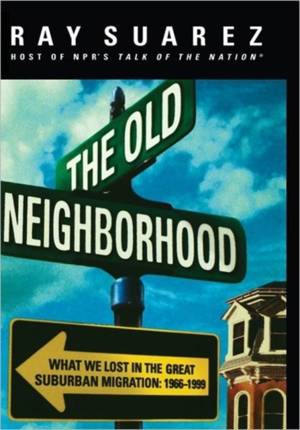
Bedankt voor het vertrouwen het afgelopen jaar! Om jou te bedanken bieden we GRATIS verzending aan op alles gedurende de hele maand januari.
- Afhalen na 1 uur in een winkel met voorraad
- Gratis thuislevering in België
- Ruim aanbod met 7 miljoen producten
Bedankt voor het vertrouwen het afgelopen jaar! Om jou te bedanken bieden we GRATIS verzending aan op alles gedurende de hele maand januari.
- Afhalen na 1 uur in een winkel met voorraad
- Gratis thuislevering in België
- Ruim aanbod met 7 miljoen producten
Zoeken
The Old Neighborhood
What We Lost in the Great Suburban Migration, 1966-1999
Ray Suarez
Hardcover | Engels
€ 71,45
+ 142 punten
Omschrijving
"Life in the city, for the millions who lived it, was once something less than the sum of their lifestyle choices: they woke up, they ate, they shoveled coal, loved, hated, prayed, mated, reproduced, died. For most, the home was not a display object but a place to keep the few things they had managed to hold on to from the surpluses produced by their labor. Their material life was made of the things they didn't have to eat, wear, or burn right this minute. A concertina maybe? A family Bible? A hunting rifle?"
This life in "the old neighborhood," so lyrically captured by Ray Suarez, was once lived by a huge number of Americans. One in seven of us can directly connect our lineage through just one city, Brooklyn. In 1950, except for Los Angeles, the top ten American cities were all in the Northeast or Midwest, and all had populations over 800,000. Since then, especially since the mid-60s, a way of life has simply vanished.
Ray Suarez, veteran interviewer and host of NPR's "Talk of the Nation(R)," is a child of Brooklyn who has long been fascinated with the stories behind the largest of our once-great cities. He has talked to longtime residents, recent arrivals, and recent departures; community organizers, priests, cops, and politicians; and scholars who have studied neighborhoods, demographic trends, and social networks. The result is a rich tapestry of voices and history. The Old Neighborhood captures a crucial chapter in the experience of postwar America. It is a book not just for first- and second-generation Americans, but for anyone who remembers the prewar cities or wonders how we could have gotten to where we are. It is a book about "old neighborhoods" that were once cherished, and are now lost.
This life in "the old neighborhood," so lyrically captured by Ray Suarez, was once lived by a huge number of Americans. One in seven of us can directly connect our lineage through just one city, Brooklyn. In 1950, except for Los Angeles, the top ten American cities were all in the Northeast or Midwest, and all had populations over 800,000. Since then, especially since the mid-60s, a way of life has simply vanished.
Ray Suarez, veteran interviewer and host of NPR's "Talk of the Nation(R)," is a child of Brooklyn who has long been fascinated with the stories behind the largest of our once-great cities. He has talked to longtime residents, recent arrivals, and recent departures; community organizers, priests, cops, and politicians; and scholars who have studied neighborhoods, demographic trends, and social networks. The result is a rich tapestry of voices and history. The Old Neighborhood captures a crucial chapter in the experience of postwar America. It is a book not just for first- and second-generation Americans, but for anyone who remembers the prewar cities or wonders how we could have gotten to where we are. It is a book about "old neighborhoods" that were once cherished, and are now lost.
Specificaties
Betrokkenen
- Auteur(s):
- Uitgeverij:
Inhoud
- Aantal bladzijden:
- 272
- Taal:
- Engels
Eigenschappen
- Productcode (EAN):
- 9780684834023
- Verschijningsdatum:
- 10/05/1999
- Uitvoering:
- Hardcover
- Formaat:
- Genaaid
- Afmetingen:
- 163 mm x 236 mm
- Gewicht:
- 566 g

Alleen bij Standaard Boekhandel
+ 142 punten op je klantenkaart van Standaard Boekhandel
Beoordelingen
We publiceren alleen reviews die voldoen aan de voorwaarden voor reviews. Bekijk onze voorwaarden voor reviews.












